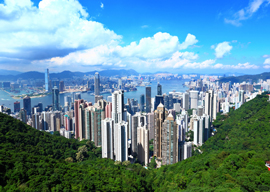
October 02, 2014

Hong Kong
Source: Shutterstock
History is full of strange folds, wrinkles, and repetitions. Consider for example the following true story.
There was once a great empire of the despotic-bureaucratic sort. It had enjoyed centuries of glory; but at last came corruption, political paralysis, foreign incursions, and fragmentation.
As the empire entered its long decline, a much smaller nation of great maritime and commercial prowess rose up, acquiring overseas territories and trading vigorously. This nation was not a bureaucratic despotism. Formal government was in the hands of ministers answering to a popular assembly. In practice, powerful aristocratic and merchant families generally had their way; but ordinary citizens enjoyed a degree of liberty unusual in the world of that time.
There was a war and a treaty. Under the terms of the treaty, the decaying empire granted to the upstart maritime nation a small piece of coastal territory”a colony”that they could use as a base for their commercial and naval operations.
This trading colony under foreign rule thrived as the empire’s fortunes continued to sink. A hundred and twenty years after the treaty, it was, according to one academic historian, producing seven times as much revenue as the imperial capital.
In the fullness of time the old empire was swept away by a newer, sterner despotism. The thriving trade colony maintained its distinct character for a few years, then succumbed to the new imperial power. It was reduced at last to an insignificant suburb.
That is of course the story of Galata, also known as Pera, situated across the Golden Horn from old Constantinople. The Byzantine Emperor Michael Palaiologus ceded the place to the Republic of Genoa in 1261 as the price for Genoa’s naval support in his plan to recapture Constantinople from the “Latin” (Catholic, West European) adventurers who had seized that city in the Fourth Crusade.
In the event, Michael regained Constantinople from the Latins without Genoa’s help, but the Genoans kept the Galata colony anyway. They held on to it through the ructions of the later 14th and early 15th centuries, and even maintained commercial autonomy for a while after the Byzantine Empire was annihilated by the Ottoman Turks in 1453. Gibbon wraps up the tale:
A long contest of one hundred and thirty years was determined by the triumph of Venice; and the factions of the Genoese compelled them to seek for domestic peace under the protection of a foreign lord … Yet the spirit of commerce survived that of conquest; and the colony of Pera still awed the capital and navigated the Euxine [i.e. the Black Sea], till it was involved by the Turks in the final servitude of Constantinople itself. [The Decline and Fall of the Roman Empire, Ch. LXIII.]
So it goes. Galata-Pera is nowadays a suburb of Istanbul, mainly famous for its soccer team.
Four hundred years after Galata was swallowed by the Ottomans, another bumptious maritime power, Britain, won another colony from a different eastern empire, China.
The British government of the time had no great hopes of the place. Prime Minister Lord Palmerston was in fact furious with the man who had acquired it, Royal Navy Captain Charles Elliot, and dismissed Elliot from his position as Britain’s trade representative in China for not having gotten better terms from the Chinese:
You have obtained the cession of Hong-Kong, a barren Island with hardly a House upon it. Now it seems obvious that Hong-Kong will not be a Mart of Trade, any more than Macao is so. However, it is possible I may be mistaken in this matter. [Palmerston to Elliot, April 21, 1841.]
He certainly was. As with Galata, Hong Kong eventually generated more revenue than Beijing, the imperial capital.
(Note that the Victorian British were mere imitators in the trading-colony game; the founders of Galata were … the Genoan article.)
When the British returned Hong Kong to Chinese sovereignty in 1997 it was a great commercial city, the seventh biggest port in the world, with six and a half million people and annual GDP per capita bigger than Canada’s ($27,330 versus $21,710).
For the third consecutive year (1995, 1996, 1997) Hong Kong had topped the Heritage Foundation Index of Economic Freedom. It has gone on doing so under Chinese rule, now with a tally of twenty consecutive years.
Compare what Heritage has to say about economic freedom in the mainland:
Over the 20-year history of the Index, China’s economic freedom has been almost unchanged, stuck near the lower boundary of the “mostly unfree” category.